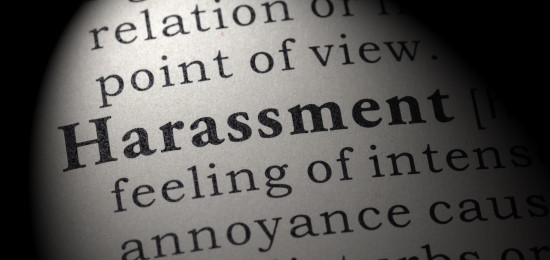
The Civil Rights Department (CRD) is responsible for enforcing state laws that make it illegal to discriminate against a job applicant or employee because of a protected characteristic (see “What is Protected” below).








These state laws barring discrimination apply to all business practices, including the following:
The Fair Employment and Housing Act (FEHA) applies to public and private employers, labor organizations and employment agencies.
It is illegal for employers of 5 or more employees to discriminate against job applicants and employees because of a protected category, or retaliate against them because they have asserted their rights under the law.
The FEHA prohibits harassment based on a protected category against an employee, an applicant, an unpaid intern or volunteer, or a contractor. Harassment is prohibited in all workplaces, even those with fewer than five employees.
The California Family Rights Act (CFRA) requires employers of 5 or more employees to provide an eligible employee with job-protected leave to care for a child, spouse, domestic partner, parent, grandparent, grandchild, or sibling with a serious health condition, and for the employee’s own serious health condition. An eligible employee may also take job-protected leave to bond with a new child by birth, adoption, or foster care placement, within one year of the child’s birth, adoption, or foster placement. “Child” means a biological, adopted, or foster child, a stepchild, a legal ward, or a child of an employee or the employee’s domestic partner, or a person to whom the employee stands in loco parentis. “Parent” includes a biological, foster, or adoptive parent, a parent-in-law, a stepparent, a legal guardian, or other person who stood in loco parentis to the employee when the employee was a child.
Employers of 5 or more employees must provide up to four months of disability leave for an employee who is disabled due to pregnancy, childbirth, or a related medical condition.
To find out if you qualify for job-protected leave due to pregnancy disability or bonding with a new child, see our Interactive App on Job-Protected Leave.
Employers of 5 or more employees are required to provide sexual harassment training to supervisory and nonsupervisory employees, and CRD accepts complaints when a person believes that an employer has not complied with these training and education requirements.
California law protects individuals from illegal discrimination by employers based on the following:
State law provides for a variety of remedies for victims of employment discrimination, including:
The FEHA applies to public and private employers, labor organizations, apprentice training programs, employment agencies, and licensing boards. An employer can be one or more individuals, partnerships, corporations or companies. Employers of five or more are subject to the FEHA’s prohibition against employment discrimination. Harassment is prohibited in all workplaces, even those with only one employee or independent contractor on staff. “Employer” does not include the federal government or a non-profit religious association or corporation.
Any applicant or employee—or an individual who works in a sheltered workshop or rehabilitation facility—can file an employment discrimination complaint with CRD. This includes applicants for training programs leading to employment. An employee, applicant, unpaid intern, volunteer, or contractor may file a complaint of harassment.
In general, a complaint of employment discrimination must be filed within three years from the date an alleged discriminatory act occurred. You must file a complaint with CRD even if you wish to file a case directly in court. If you wish to go to court, you can request an immediate “right to sue” notice when you file your complaint.
No. The FEHA applies to California workers regardless of their citizenship or immigration status. CRD does not inquire about citizenship or immigration status.
If a complaint has been filed with EEOC, it will automatically be filed with CRD as well, although the EEOC will usually investigate. If a complaint is filed with CRD and alleges facts that would violate a law enforced by the EEOC, the complaint is automatically filed with EEOC, although CRD will usually investigate. The worksharing agreement between CRD and EEOC is posted on our website.
Start by filing an “Intake Form.” You can find that form using any of the following methods:
If you have a disability that prevents you from submitting a written pre-complaint form online, by mail, or email, the CRD can assist you by scribing your pre-complaint by phone or for individuals who communicate by American Sign Language through the relay system. Contact the Contact Center 800-884-1684 (voice or 711 relay operator) or 800-700-2320 (TTY) or by email to contact.center@dfeh.ca.gov to schedule an appointment.
CRD gathers evidence to determine if the complainant’s allegations can be proven. The individual filing the complaint is called a complainant and the employer is called a respondent. The investigation process includes gathering evidence from both sides, interviewing the parties and witnesses, and reviewing records. An investigation may be conducted on site and/or through telephone interviews. CRD has the authority to take interviews under oath, issue subpoenas and interrogatories and seek temporary restraining orders during the course of its investigation. All evidence gathered is analyzed to determine if a violation of the Fair Employment and Housing Act has occurred.
In general, CRD has up to one year from the date a CRD complaint is filed to complete an investigation.
CRD retains records for 3 years after an investigation is closed.
No. During the investigation, CRD acts as an objective fact-finder, gathering evidence to determine whether the complainant’s allegations can be proven. CRD does not represent either the complainant or the respondent.
If the investigation establishes that there is evidence to support the complainant’s allegations, and the parties do not reach a settlement, CRD’s Legal Division reviews the case for potential litigation in court. CRD has attorneys who prepare and file cases in court.
When CRD decides to sue, it files a civil lawsuit in the name of the Civil Rights Department against the employer. CRD attorneys represent the Department, not the individual complainant. The complainant is a real party in interest in the lawsuit.
Although the assigned CRD attorney is not the complainant’s personal legal advisor, the complainant’s interests are important in the litigation, and the complainant receives 100% of any remedies recovered, with the exception of attorney fees and costs. CRD does not charge complainants attorney fees or expert witness fees, nor does it take a percentage of any award or settlement.
The remedies available for employment discrimination include:
Not if the employee used CFRA or FMLA leave for the employee’s own serious health condition. When an employee with a serious health condition can’t return to work after 12 weeks of CFRA or FMLA leave, the employer must initiate an interactive process to consider reasonable accommodations such as additional leave.
Not if the employee (a) is disabled and entitled to leave or time off as a reasonable accommodation, or (b) has a “serious health condition” and qualifies for leave under CFRA or FMLA.
CRD does not have jurisdiction over all workplace complaints. It can only help resolve employment complaints that involve discrimination or harassment based on a FEHA-protected characteristic such as race, sex, religion, national origin, or disability, for example, or reasonable accommodation, CFRA or PDL complaints.
CRD Cannot Help With
Instead Contact